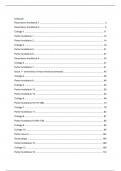Summary
Uitgebreide samenvatting van Introductie van Communicatiewetenschap - college-aantekeningen, samenvatting van boeken (Rosenberry en Potter)
- Course
- Institution
Dit is een uitgebreide samenvatting van het vak Introductie van Communicatiewetenschap aan de Radboud Universiteit (Communicatiewetenschap jaar 1). In deze samenvatting staat ALLES wat je moet weten voor de TWEE tentamens: college-aantekeningen en samenvattingen van de hoofdstukken uit de boeken.
[Show more]



